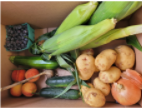Before it ended in 1852, the Irish Potato Famine resulted in the death of one million people by starvation and related causes. Between 1845 and 1855, as many as two million people left Ireland. In that decade, one in four Irish people had either died or left the country.
While watching the grading machines sort potatoes, Larry Simpson speculated that the Potato Famine may have been the reason for his second great grandparents to depart Ireland for Canada. Parts of the original farm in Ballantrae, which were deeded in 1845, are still integral to the family business for the 5th, 6th & 7th generation of Simpsons, while generation 8th enjoys the farm as a play-place while growing up.
The Simpsons came from potato culture and brought it with them to Canada. 5.8 million tons of potatoes (1 million hundred-weight) were estimated to be harvested in Canada in 2020. Overall production had dropped due to uncertainty for restaurant demand at the onset of COVID-19. Another effect, the ‘king of potato’ (Prince Edward Island) was toppled in production by both Manitoba and Alberta, if only for now. Ontario’s production comes in around 7th place with 421,000 tons of potatoes.
Larry explained that production is ever evolving. “People used to buy a 75-pound bag for the cold cellar to get them through the winter. Now days, people would rather we store the potatoes and they’ll buy 10-pound bags as needed.” As shopping patterns change, so did the need for the Simpsons to invest in equipment like grading machines and to evolve farming methods. He said that they ship potato by truck, but back in the day, his forefathers would load them onto the Lake Simcoe Junction Railway (LSJR) for delivery to Toronto, which passed through the back of their farm; the tracks Ballantrae-to-Stouffville were pulled up around 1930 (W-S Museum has the Ballantrae Station sign in their holdings).
This year, the Simpsons are farming about 150 acres. Total acreage changes annually, as the crops need to rotate in order to limit the spread of plant diseases. In addition to interrupting disease cycles, rotating crops prevents the depletion of nutrients. Tired soils will produce lower yields. Larry explains that they will ‘trade fields’ with other farmers, and each focus on their specialty, whether it be corn, wheat, potato or other crops.
Larry and Jared took a leading role in the business and incorporated to become Simpson Family Farms Inc in 2018, however Larry started growing potatoes on large scale in the 1980s as Simpson Produce. Jared has been planting potato since he was a child. He remembers picking them by hand and taking them down to the Stouffville Sales Barn to sell at the market. The Simpsons were the last ‘real farmers’ selling at the Sales Barn.
Today, the Simpsons sell most of their produce to restaurants, from Stouffville to as far as Belleville and Burlington. They also supply a half dozen independent grocery stores, but mostly have learned to avoid the corporate world of big box grocery operations.
Jared’s grandfather Harry Simpson, at 85 years old, continues to be involved in the family business. “I was 9 years old when I learned to drive a tractor on this field,” said Harry. “My grandfather towed a one row picker behind three horses. I didn’t care much for driving horses. Once I got on a tractor, I never got back off,” recalled Harry.
Jared had married a ‘city girl’ from Richmond Hill named Nikki. When Nikki was young, Richmond hill wasn’t the city it is now – she remembers Major Mackenzie as being a dirt road. “A lot has changed in a short amount of time,” recounts Nikki.
Nikki and Jared have had three kids, and she never went back to work in the city after the first was born. Instead, Nikki became the Administrator of the farm. She has a degree in Human Resources, so taking over the payroll and daily accounting was not daunting. “They were still doing the books by hand when I came,” said Nikki.
Nikki served as President for York Farm Fresh for two years, an organization that was being reestablished, but this time under the management and supervision of local farmers. After two years, with the birth of the twins, Nikki had to resign the position – although, she never stopped thinking about people and food.
The Simpsons previously sold their vegetables at farmer’s markets, but after COVID added another complexity to an already marginal proposition, they decided to adjust their business dynamic. “I could see that people desire a relationship with their food – wanting to know how and where it is grown,” said Nikki, so two seasons ago, she cultivated an idea: The Farm Fresh Box Program. With this program, subscribers can sign up for weekly vegetable boxes for the entire season, month to month, or weekly.
The boxes feature a variety of produce as it is seasonally ready to harvest – a majority of which is picked the same day or within 24 hours. Creative recipes are included, as Nikki says, “there are a many interesting ways to prepare produce.” In addition, items from other made-local vendors can be added to the box, such as farm fresh eggs, freshly baked bread, honey, maple syrup, fudge, pies, and treats. Nikki refers to the box program as her personal hobby, yet she has built a clientele base of 50-80 subscribers.
“I love the Greenbelt,” concludes Nikki. “The farm is a great place to teach the kids about food, work and family dynamics. This is how we bring seven generations of farming from our field to your plate.”

